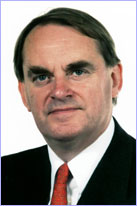Timothy Kirkhope – 2002 Speech at the European Convention
The speech made by Timothy Kirkhope on 21 March 2002.
This is the second convention on which I have sat, having been on the Charter of Fundamental Rights Convention. Although I was not totally happy with the results of that Convention, it did establish a new model of negotiation which excites me and many other people too. The Guardian newspaper in Britain this morning rightly said that this Convention will be seen to have more democratic legitimacy than the secretive wrangling of national leaders as witnessed most recently at the Barcelona summit.
We must remember that Europe is not on trial here. Europe is part of the equation, part of the democratisation of Europe. After all, the peoples of Europe want to see all the institutions, not only the European ones but also the national Parliaments themselves, look carefully at their own activities. Maybe they want to reclaim some powers from Europe. At the same time, there is a general lack of confidence in politicians that we will have to address in the work we do here.
I want to just support you, Mr. President, in what you have said about young people. I believe that the future of Europe is not just ours. I hope I’ve got a little of a future left in Europe, but young people have a much bigger future and a bigger stake in the future of Europe. It is therefore essential for us, as part of the listening process that we are now embarking on, to make sure that young people are a significant part of the consultation process and that their aspirations for the future are listened to. I shall certainly consult very carefully with young people, Mr President. You identified it yourself and I think you hit the nail on the head, as they say, in doing so.
My only other remark is this. When consulting civil society, it is terribly important for us to draw the boundaries of civil society as widely as possible. There are some who call themselves representatives of civil society but who actually represent narrow vested interests. In order to avoid this problem, we must consult widely as part of the listening process.
Whatever we get at the end of this process, I hope it is a great success, and I hope we regain public confidence in our institutions.

